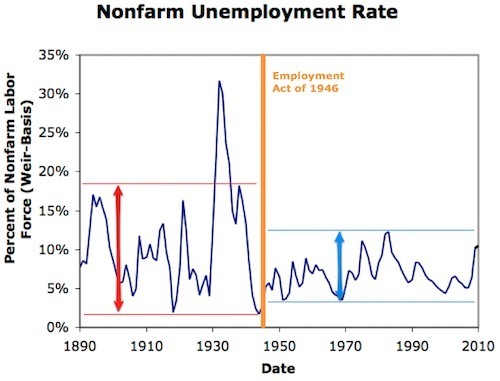Before and After Macroeconomic Stabilization
Brad DeLong makes the case that despite the failures of current macroeconomic stabilization policy, you can still see that we're doing this much better since World War II than we did before:

This is worth noting because it's always worth pushing back against a certain kind of passive fatalism that becomes fashionable in bad times. History is a long game. As bad as the problems of the 2010s are, they're not as bad as the problems of the 1930s or the 1890s. By the 2050s, the world will still have problems but there's reason to believe that with hard work and determination we can make that a much better world. The 2050s are a long way off, of course, but in a world with a median age of 28 a great many of us will hopefully still be alive by that time.
I mention this because around the office not everyone is as convinced as I am by the merits of this tax deal. But I'm convinced because, fundamentally, I'm a real believer in macroeconomic stabilization policy. If it were up to me, I'd much rather see the deficit increased via infrastructure investments and other good stuff instead of tax cuts, many of them regressive. But I also do think that in a world of nearly ten percent unemployment job number one of the President should be to find the Maximum Politically Feasible Fiscal Stimulus and this deal seems like a decent approximation of that. If lefties want to try to hold out for a better deal, that seems non-outrageous to me, but what I would hold out for is even more stimulus rather than smaller tax cuts.


Matthew Yglesias's Blog
- Matthew Yglesias's profile
- 72 followers



